- Last Updated: January 15th, 2026
Key Takeaways
Social media users should carefully review privacy policies and terms of service to understand how platforms collect, use, and share their data.
Common social media privacy violations include collecting unauthorized data, sharing user information with third parties without consent, and using personal data for targeted advertising.
Individuals can take legal action against social media companies for privacy breaches under laws like the GDPR and should implement strong account security measures to protect their personal information.
Overview of Social Media Privacy Violations
On this page, we’ll discuss social media privacy violations, how user privacy can be violated on social media platforms, legal protection of social media privacy, and much more.
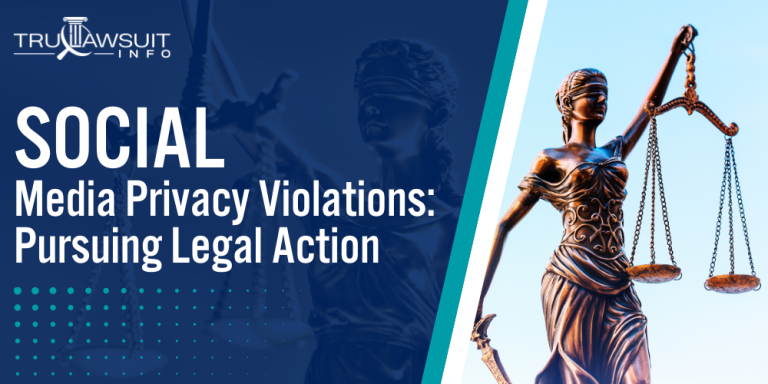
Intro to Social Media Privacy Violations
Some of the key aspects of Social Media Privacy Violations include, but are not limited to:
- Data Breaches: Social media platforms can be vulnerable to data breaches, exposing sensitive user information to unauthorized parties.
- Misuse of User Data: Social media companies may misuse user data for targeted advertising or sell it to third parties without proper consent.
- Insufficient Privacy Settings: Inadequate privacy settings on social media platforms can lead to the unintended sharing of personal information.
- Legal Protections: Various laws, such as the General Data Protection Regulation (GDPR) and the California Consumer Privacy Act (CCPA), provide legal protections for user privacy.
If your privacy has been violated by a social media platform, you may have legal options to seek recourse.
Contact Tru Lawsuit Info today using the chat on this page to receive an instant case evaluation.
Understanding Social Media Privacy Rights
When diving into the world of social media, one must understand the intricacies of privacy rights and how they apply in this digital landscape.
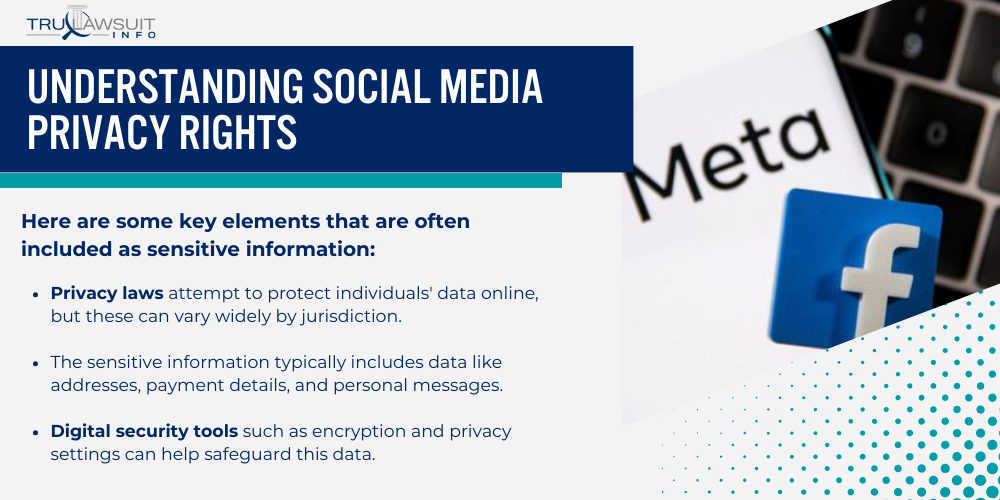
Defining Privacy in the Digital Age
The definition of privacy in the digital age has evolved as technology has advanced.
Social media sites have made it possible to share vast amounts of personal and sensitive information with the click of a button.
Here are some key elements that are often included as sensitive information:
- Privacy laws attempt to protect individuals’ data online, but these can vary widely by jurisdiction.
- The sensitive information typically includes data like addresses, payment details, and personal messages.
- Digital security tools such as encryption and privacy settings can help safeguard this data.
- Regardless of the platform, creating a new social media account often requires users to share personal information.
Examining Terms of Service Agreements Social media users agree to Terms of Service agreements that govern the use of the platform.
Examining Terms of Service Agreements is essential because these documents outline how platforms manage user data:
- These agreements often contain clauses related to privacy concerns and the collection of sensitive information.
- They are legally binding and can have implications for the user’s privacy rights.
- It’s critical for users to review and understand these terms thoroughly before creating an account.
- Terms of Service agreements define the relationship between the user and the social media company regarding data handling and privacy.
Common Types of Social Media Privacy Violations
With the vast amount of personal information shared on social media, users often face significant privacy risks.
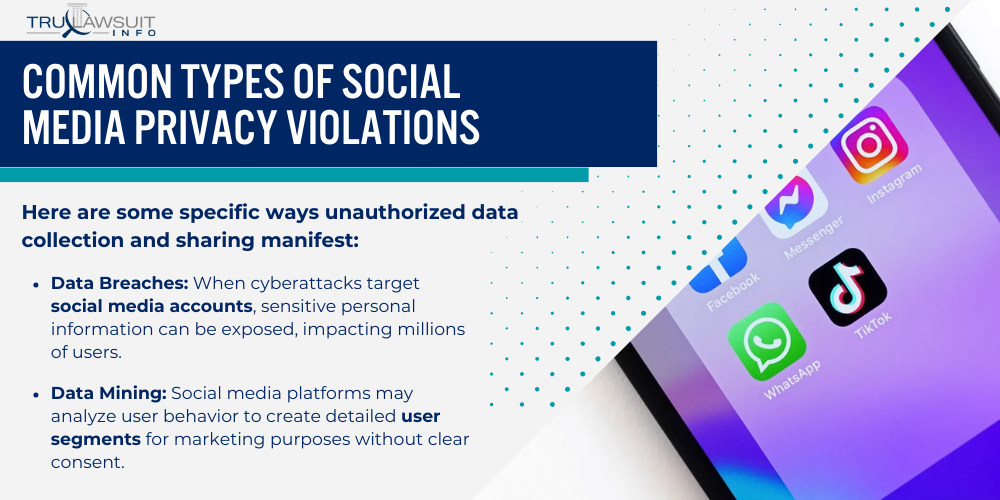
This section explores frequent privacy violations on these platforms, focusing on two main areas: unauthorized data practices and third parties’ misuse of personal data.
Unauthorized Data Collection and Sharing
Social media platforms collect various types of user data, often more than users might expect.
Here are some specific ways unauthorized data collection and sharing manifest:
- Data Breaches: When cyberattacks target social media accounts, sensitive personal information can be exposed, impacting millions of users.
- Data Mining: Social media platforms may analyze user behavior to create detailed user segments for marketing purposes without clear consent.
- Cross-Site Tracking: Users can be followed across the internet with their behavior on one site informing their profile on another, often without their knowledge.
- Third-Party Applications: When users connect their social media accounts with external apps, they might unintentionally grant access to their data, which can then be collected and shared.
Misuse of Personal Information by Third Parties
Third parties frequently access and use personal information from social media in ways that users might not anticipate or agree with.
Specific issues include:
- Target Users: Personal data is often used to target users more precisely with ads, manipulating purchasing decisions without transparent practices.
- Unauthorized Access: Sometimes, third-party applications gain more access to user information than explicitly authorized.
- Reselling User Data: Third parties often resell user data to other advertisers or brokers, spreading personal information far beyond the original collection point.
- Inadequate Safeguards: Lack of rigorous security measures to protect user data can lead to potential misuse or unauthorized access.
Gathering Evidence of Privacy Violations
When investigating privacy violations on social media, collecting concrete evidence is essential.
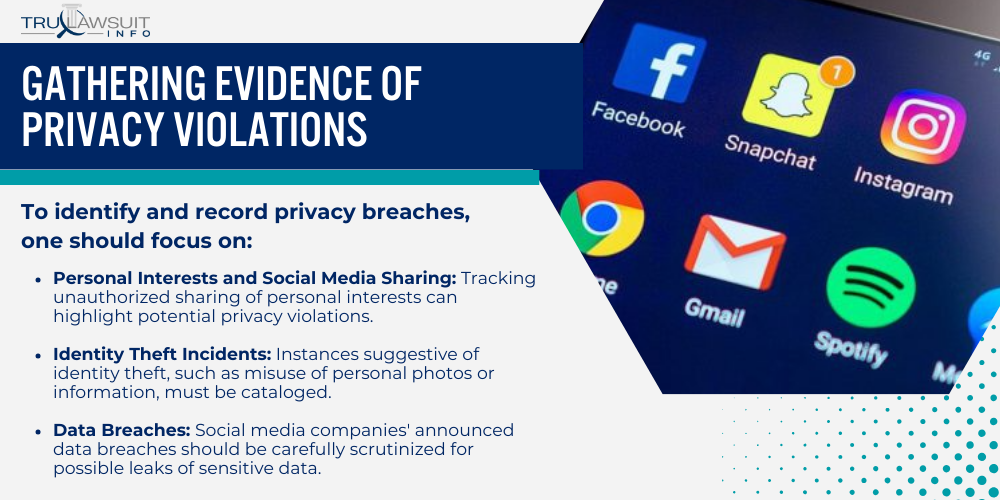
Documenting instances where personal interests or sensitive data have been compromised and preserving all digital records form the twin pillars of an effective inquiry process.
Documenting Instances of Privacy Breaches
The pervasive use of digital technology has made privacy breaches increasingly common, necessitating vigilant monitoring and documentation by organizations and individuals alike.
This documentation is crucial in understanding the scope of privacy violations and in formulating strategies to prevent them.
To identify and record privacy breaches, one should focus on:
- Personal Interests and Social Media Sharing: Tracking unauthorized sharing of personal interests can highlight potential privacy violations.
- Identity Theft Incidents: Instances suggestive of identity theft, such as misuse of personal photos or information, must be cataloged.
- Data Breaches: Social media companies’ announced data breaches should be carefully scrutinized for possible leaks of sensitive data.
- Location Data Exposures: Unauthorized sharing or tracking of location data is a clear breach of user privacy.
Sensitive data forms the core of many privacy concerns on social media platforms, and each instance needs thorough documentation.
Preserving Digital Records and Communications
In the digital age, maintaining a comprehensive archive of digital communications and records has become essential for safeguarding privacy and providing accountability.
This archival process helps ensure that evidence of any misconduct or breach can be reliably retrieved and used for analysis or legal purposes.
For legal and investigatory purposes, it is vital to preserve digital evidence:
- Screenshots of Unauthorized Social Media Data Sharing: These serve as timestamped proof of privacy violations.
- Emails or Notifications From Social Media Platforms: Official communications can provide context and validate instances of breaches.
- Logs of Access to Social Media Accounts: These can help establish any unauthorized activity that might have led to a compromise.
- Copy of Personal Profiles: A current version of one’s social media profile can be compared against unauthorized changes, indicating potential misuse.
By maintaining meticulous records and communications, one can build a solid foundation for addressing and rectifying privacy violations in social media contexts.
Determining the Appropriate Legal Action
When a privacy violation occurs on social media, it’s important to determine the best course of legal action to take.

This often involves assessing the gravity of the breach and deciding whether an individual or class action lawsuit is more appropriate.
Evaluating the Severity of the Privacy Violation
Before pursuing legal action, one must evaluate the severity of the privacy breach.
Critical factors include:
- Extent: How widespread is the violation? Did it affect one person or a large group of users?
- Damage: What is the magnitude of harm caused by the breach? Are there financial, emotional, or reputational damages?
- Intention: Was the privacy violation an accidental oversight or a willful disregard for user privacy?
- Precedent: Are there past instances of similar violations by the same entity showing a pattern of neglect?
Understanding these elements helps social media users decide on the severity of the legal response needed.
Considering Individual vs. Class Action Lawsuits
Determining whether to file an individual lawsuit or join a class action can be nuanced.
Here are the considerations:
- Individual Impact: Does the privacy breach uniquely affect an individual, warranting a specific claim?
- Collective Power: Would individuals benefit from the collective power and shared legal costs of a class action?
- Legal Representation: Are there attorneys willing to represent individuals, or is there a stronger inclination towards a class action model?
- Federal Trade Commission Involvement: Could the FTC’s interest in enforcing privacy concerns influence the choice of legal proceedings?
In tackling privacy concerns, both individuals and groups must navigate the legal landscape to protect their rights within the social media space.
Filing a Complaint with Regulatory Agencies
When individuals believe their privacy has been compromised on social media, they have the option to file a complaint with regulatory bodies.
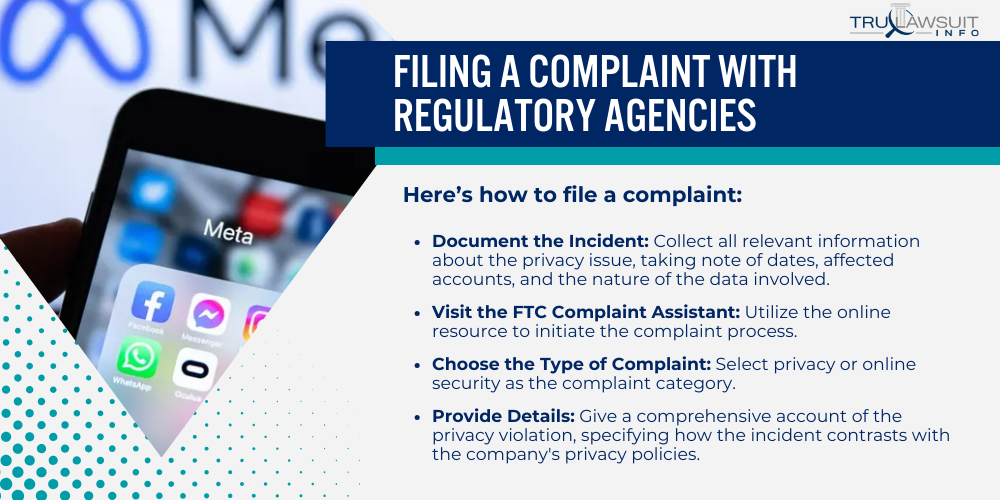
These steps help users address potential violations of privacy laws.
Reporting Violations to the Federal Trade Commission
The Federal Trade Commission (FTC) acts as a national enforcer for data protection matters.
Here’s how to file a complaint:
- Document the Incident: Collect all relevant information about the privacy issue, taking note of dates, affected accounts, and the nature of the data involved.
- Visit the FTC Complaint Assistant: Utilize the online resource to initiate the complaint process.
- Choose the Type of Complaint: Select privacy or online security as the complaint category.
- Provide Details: Give a comprehensive account of the privacy violation, specifying how the incident contrasts with the company’s privacy policies.
Filing a complaint with the FTC is a structured process that allows consumers to report misconduct and enforce their privacy rights.
Seeking Assistance from State Attorney General Offices
State Attorney General offices offer recourse at a state level.
Here’s how one might utilize their services:
- Identify Your State Office: Locate the Attorney General’s office for your state of residence.
- Gather Evidence: Prepare all information regarding the privacy violation incident, similar to the FTC reporting process.
- File a Complaint: Some states may have an online submission process, while others might require sending documents by mail.
- Wait for a Response: After you submit the complaint, the office will review it and decide on any potential actions.
Engaging with State Attorney General offices plays a critical role in advocating for data privacy on a state level.
Initiating a Lawsuit Against Social Media Companies
When individuals believe a social media company has violated their privacy, they may consider legal action.
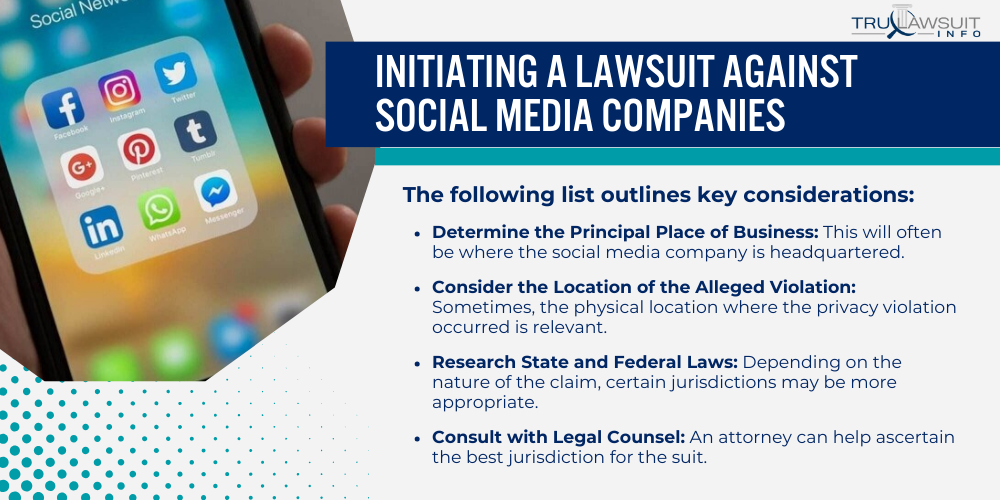
This section discusses the concrete steps one must take to initiate a lawsuit against such companies.
Identifying the Proper Jurisdiction and Court
The first step in taking legal action is to determine where to file the lawsuit.
This involves understanding where the company operates and where the violation occurred.
The following list outlines key considerations:
- Determine the Principal Place of Business: This will often be where the social media company is headquartered.
- Consider the Location of the Alleged Violation: Sometimes, the physical location where the privacy violation occurred is relevant.
- Research State and Federal Laws: Depending on the nature of the claim, certain jurisdictions may be more appropriate.
- Consult with Legal Counsel: An attorney can help ascertain the best jurisdiction for the suit.
Drafting and Filing the Complaint
Once the jurisdiction is established, the next step is to draft the legal complaint.
The complaint lays out the allegations against the social media company and requests relief.
Here are the essential elements to include:
- Clearly State the Facts: It’s important to present a clear narrative of what happened and how it violated privacy.
- Cite the Applicable Laws: Reference the specific privacy laws or regulations the social media company has allegedly breached.
- Outline the Damages Sought: This specifies what the plaintiff is asking for in terms of compensation or other relief.
- File the Complaint With the Court: Ensure all filing procedures and deadlines are meticulously followed to avoid delays.
By carefully identifying the proper jurisdiction and meticulously drafting the complaint, individuals set the stage for a lawsuit against social media companies alleged to have violated privacy.
It is essential to navigate these steps accurately to ensure that the legal process begins on solid footing.
Navigating the Discovery Process
In legal social media disputes, the discovery process plays a significant role in gathering evidence.
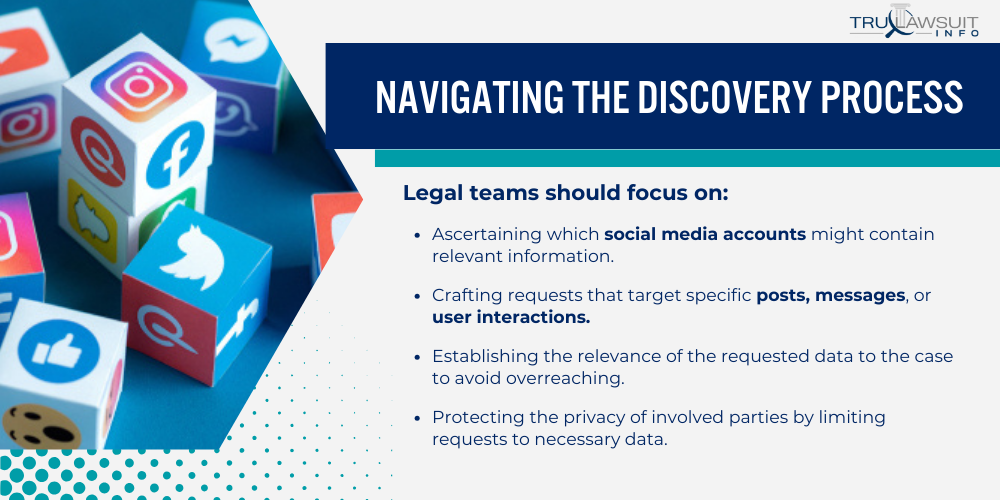
Attorneys must identify and request pertinent information from social media sites while safeguarding sensitive data.
Requesting Relevant Documents and Data
The successful acquisition of evidence from social media sites hinges on precisely framed requests for documents and data.
Legal teams should focus on:
- Ascertaining which social media accounts might contain relevant information.
- Crafting requests that target specific posts, messages, or user interactions.
- Establishing the relevance of the requested data to the case to avoid overreaching.
- Protecting the privacy of involved parties by limiting requests to necessary data.
Conducting Depositions of Key Witnesses
Depositions serve as a critical tool for attorneys to gauge and record witness testimony related to social media activity.
Key steps include:
- Identifying potential witnesses, such as social media managers or account holders.
- Preparing questions that extract insights on the usage of the accounts and the handling of sensitive data.
- Gaining an understanding of the content management process to spot any potential misconduct.
- Exploring whether identity theft scammers may have compromised account security.
Attorneys approach these depositions with the intent to illuminate how precisely social media usage intersects with the legal issues at hand.
The testimony provided can uncover crucial evidence regarding claims and defenses in the case.
Pursuing Settlement Negotiations
When individuals face privacy violations on social media platforms, a preferred course of action is to seek a resolution through settlement negotiations.
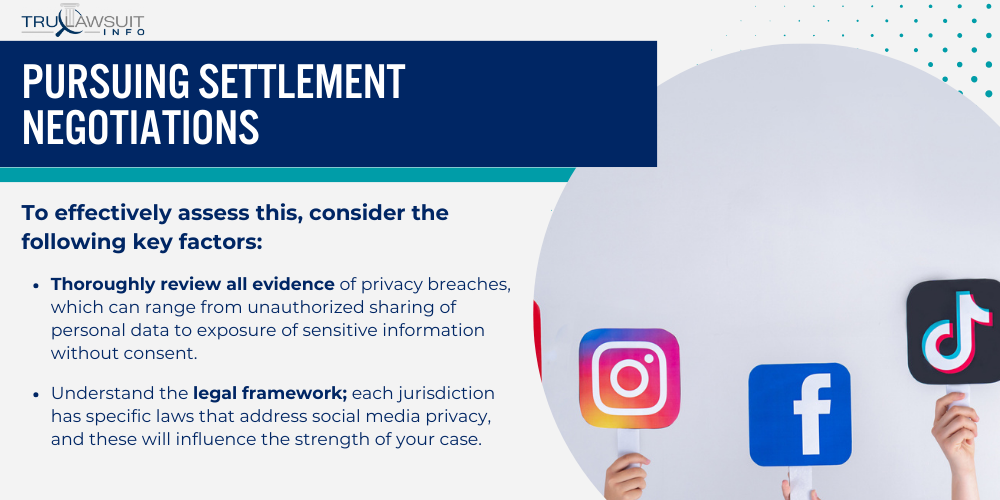
This process can mitigate additional risks and expedite the journey towards a fair outcome.
Assessing the Strength of Your Case
One’s strategy in settlement negotiations often hinges on the robustness of the case.
To effectively assess this, consider the following key factors:
- Thoroughly review all evidence of privacy breaches, which can range from unauthorized sharing of personal data to exposure of sensitive information without consent.
- Understand the legal framework; each jurisdiction has specific laws that address social media privacy, and these will influence the strength of your case.
- Identify precedents where similar breaches have occurred, as they can provide insight into potential outcomes.
- Consider the impact of the breach, including any emotional distress, identity theft, or loss of reputation that may have occurred.
Engaging in Mediation or Arbitration
Mediation or arbitration can be an effective means to resolve privacy disputes while avoiding the public scrutiny of a court case.
To maximize the effectiveness of mediation or arbitration, consider implementing the following strategies:
- Select a neutral mediator or arbitrator experienced in social media privacy issues to ensure informed guidance during the process.
- Enter the discussions with a clear understanding of your objectives and the minimum acceptable outcome.
- Maintain open communication with the opposing party to build a foundation for constructive dialogue.
- Be prepared to address additional risks, such as future data security or reparations for past damages.
Preparing for Trial
In the era of digital information, preparing for trial in cases of social media privacy violations requires a precise legal approach and thorough consideration of how social media accounts and potential identity theft can impact the judicial process.
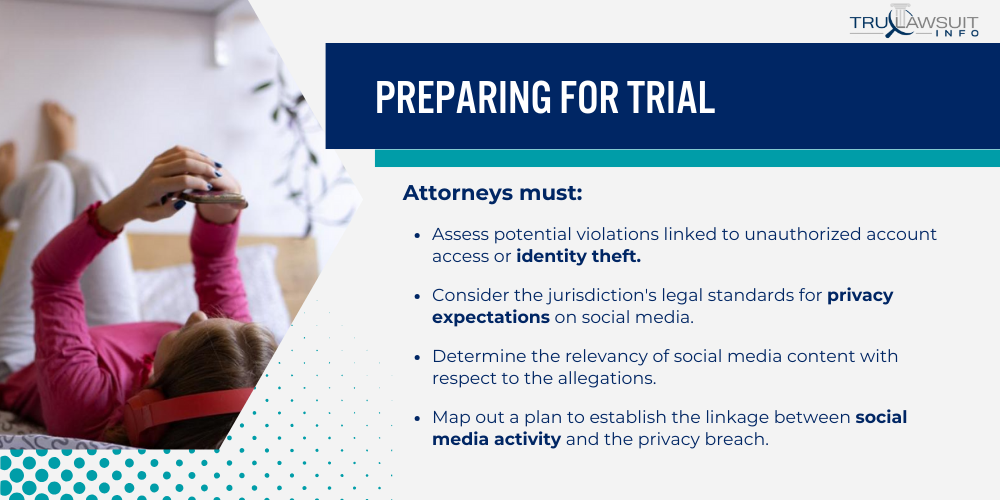
Developing a Compelling Legal Strategy
A meticulously crafted legal strategy is pivotal for addressing privacy violations in social media platform cases.
Attorneys must:
- Assess potential violations linked to unauthorized account access or identity theft.
- Consider the jurisdiction’s legal standards for privacy expectations on social media.
- Determine the relevancy of social media content with respect to the allegations.
- Map out a plan to establish the linkage between social media activity and the privacy breach.
Key factors, such as a social media account’s privacy location settings and user agreements, require a detailed examination to fortify a legal argument.
Presenting Evidence and Testimony in Court
When the privacy intrusion involves social media, presenting evidence becomes a nuanced process.
The attorney should:
- Verify the authenticity of social media records and attribute posts to the correct individual.
- Highlight timestamps and disable geolocation data that can indicate unauthorized use or identity theft.
- Prepare witnesses who can testify about social media activity and its legitimacy.
- Ensure compliance with data privacy laws when introducing social media data as evidence.
The interpretation of digital footprints left on social media platforms often plays a significant role in a court’s assessment of privacy violations.
Seeking Damages and Remedies
In pursuing justice for social media privacy breaches, individuals and entities may seek financial recourse and demand systemic changes to prevent future violations.
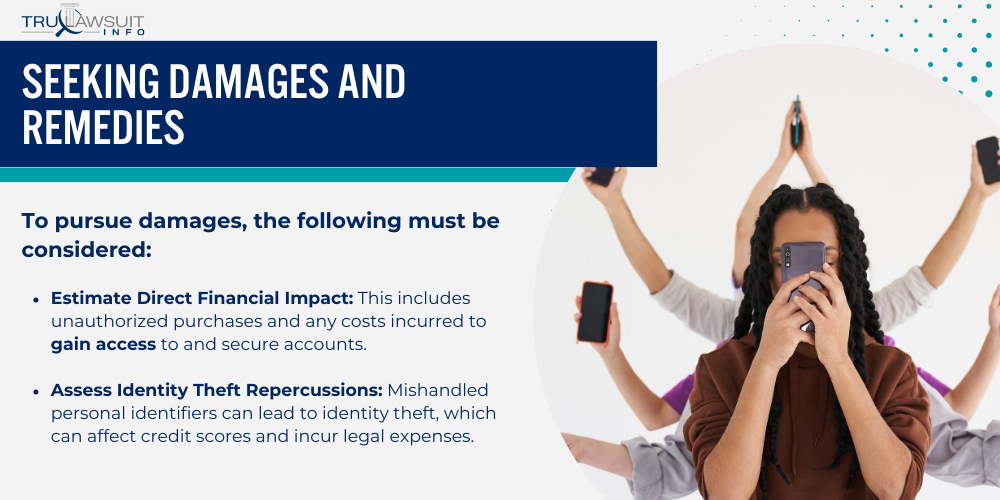
This includes calculating financial losses and demanding injunctive relief, both of which are essential for holding violators accountable and safeguarding personal identifiers.
Calculating Financial Losses from Privacy Violations
When privacy is compromised, the financial implications can be significant.
To pursue damages, the following must be considered:
- Estimate Direct Financial Impact: This includes unauthorized purchases and any costs incurred to gain access to and secure accounts.
- Assess Identity Theft Repercussions: Mishandled personal identifiers can lead to identity theft, which can affect credit scores and incur legal expenses.
- Determine Lost Income: If privacy breaches negatively affect reputations, one may experience job loss or diminished earning potential.
- Quantify Emotional Distress: While harder to value, emotional impacts due to privacy violations are increasingly recognized in claims.
Demanding Injunctive Relief and Policy Changes
To truly address the systemic issues underlying privacy breaches, it is crucial to pursue both injunctive relief and substantive policy changes within social media companies.
These legal actions can compel platforms to adopt stricter data security measures and enforce higher standards of privacy protection.
Achieving systemic change often requires going beyond financial compensation:
- Implement Stronger Privacy Controls: Victims can advocate for the social media platform to enhance safeguarding measures.
- Forge Better Data Handling Policies: Insist on clear policies for how personal data is managed and protected.
- Enforce Transparency in Data Breaches: Demand that users are promptly informed when their data has been compromised.
- Encourage Ethical Data Practices: Pressure platforms to uphold ethical standards in the treatment of user data.
Trulawsuit Info: #1 Social Media Lawyer
When it comes to privacy violations on social media, users often feel helpless.

Facebook users have sometimes found their personal information misused without their consent.
In response, a specialized field of legal practice has emerged, focusing on defending digital privacy rights.
Known as the #1 Social Media Lawyer, these legal professionals are the go-to experts for navigating the legal landscape of online privacy.
Here are a few ways in which these lawyers assist Facebook users and their user’s friends:
- Investigating Breaches: They look into instances where personal data may have been shared without proper authorization.
- Advising on Privacy Settings: They offer guidance to help ensure account settings provide maximum privacy and control over one’s data.
- Litigating Privacy Violations: They represent individuals in court who have had their privacy breached.
- Educating Clients: They ensure that users are well-informed about their rights and the ways they can protect their personal information on social media platforms.
Engaging with a Social Media Lawyer provides a level of defense against the invasion of privacy.
These lawyers understand the importance of maintaining the confidentiality of personal information and guide their clients in securing it against unauthorized use.
Their specialized knowledge allows them to represent their clients effectively, addressing such intricacies with a neutral and knowledgeable approach.
Frequently Asked Questions
-
Unauthorized access is a serious concern when it comes to personal accounts and sensitive information.
Hackers and malicious actors can gain access to this information, leading to potential harm.
Additionally, social media companies themselves collect user data, which can be mishandled and used inappropriately.
-
Here are some common practices and the privacy concerns they trigger:
- Data Collection: Companies collect vast amounts of user data for targeted advertising.
- Data Sharing: Personal information is often shared or sold to third parties, raising concerns about consent and control over personal information.
-
There have been significant incidents where data was incorrectly accessed for political advertising.
Personal data has also been misused to create manipulative consumer profiles without explicit user consent.
-
Privacy regulations, such as GDPR, require companies to obtain user consent for processing data.
Individuals can take legal action against companies for data breaches under specific privacy laws.
-
It is important to update privacy settings to limit public access regularly.
Exercise caution when sharing personal information, even with trusted connections, and use strong, unique passwords along with two-factor authentication wherever possible to secure your accounts.
-
A study revealed that a majority of interviewees experienced some form of privacy violation.
Research analyzing Facebook privacy settings discovered instances where default settings were not protective enough, leading to potential privacy violations.

Attorney Jessie Paluch, founder of TruLawsuit Info, has over 25 years of experience as a personal injury and mass tort attorney, and previously worked as an international tax attorney at Deloitte. Jessie collaborates with attorneys nationwide — enabling her to share reliable, up-to-date legal information with our readers.
Legally Reviewed
This article has been written and reviewed for legal accuracy and clarity by the team of writers and legal experts at TruLawsuit Info and is as accurate as possible. This content should not be taken as legal advice from an attorney. If you would like to learn more about our owner and experienced injury lawyer, Jessie Paluch, you can do so here.
Fact-Checked
TruLawsuit Info does everything possible to make sure the information in this article is up to date and accurate. If you need specific legal advice about your case, contact our team by using the chat on the bottom of this page. This article should not be taken as advice from an attorney.
You can learn more about the Social Media Harm Lawsuit by visiting any of our pages listed below:
Here, at Tru Lawsuit Info, we’re committed to helping victims get the justice they deserve.
To do this, we actively work to connect them with attorneys who are experts in litigating cases similar to theirs.
Table of Contents
Tru Lawsuit Info is a reliable source of information about issues that may affect your health and safety, such as faulty products, data breaches, and environmental hazards.
Our team of experienced writers collaborates with medical professionals, lawyers, and advocates to produce informative articles, guides, and other resources that raise awareness of these topics.
Our thorough research provides consumers with access to reliable information and updates on lawsuits happening around the country. We also can connect consumers with attorneys if they need assistance.
Here, at Tru Lawsuit Info, we’re committed to helping victims get the justice they deserve.
To do this, we actively work to connect them with attorneys who are experts in litigating cases similar to theirs.
